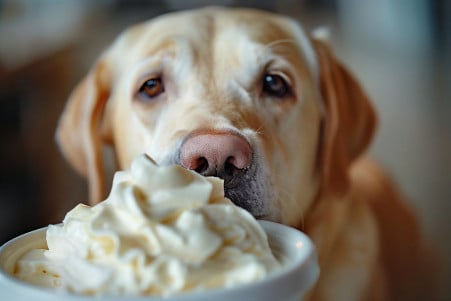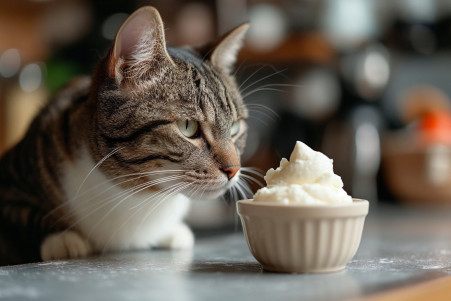Can Dogs Have Whipped Cream? Dairy Tolerance in Dogs
28 February 2024 • Updated 26 February 2024

If you’ve ever wanted to share a little whipped cream with your dog, you may have wondered if it’s OK to do so. Dogs can have whipped cream in moderation if they aren’t lactose intolerant. That said, it’s high in fat and sugar, which can contribute to obesity and pancreatitis. And, of course, you should never give your dog whipped cream that contains xylitol, which is poisonous to dogs.
This article will delve into veterinary expert opinions and nutritional breakdowns to answer questions about dogs and whipped cream. It will also look at research by animal nutritionists and studies of the dietary tolerances of dogs to determine which ingredients in whipped cream can cause issues for dogs.
This article will help you learn where occasional indulgences like whipped cream can fit into a dog’s diet and what kind of health effects they can have.
Can dogs have whipped cream?
How to Manage Lactose Intolerance in Dogs
Lactose intolerance in dogs is the inability to properly digest lactose, the sugar in milk and dairy products. According to PetMD, this is a common problem in adult dogs, although not all dogs are lactose intolerant.
Most dogs become lactose intolerant as they age and their bodies produce less of the enzyme lactase, which is needed to break down lactose. As Dr. Tawnia Shaw from The Happy Pet Vet explains, the lack of lactase can lead to gastrointestinal issues like diarrhea and gas.
On the other hand, some dogs have a high tolerance for lactose, and this is due to genetic differences. A study that was covered by the International Milk Genomics Consortium found that a mutation that increases lactase persistence in dogs is common in Europe and the Middle East, just as it is in humans from these areas.
Meanwhile, the mutation is less common in dogs from Southeast Asia, which suggests that the dietary history of human agriculture has influenced dogs’ lactose tolerance.
Because of these differences, pet parents need to pay close attention to how their dog responds to dairy when it’s added to their diet. This is especially important when you’re trying to determine how your dog will react to dairy-based treats. This is why it’s important to know how lactose intolerant your dog is when you’re thinking about giving them whipped cream or other dairy-based treats.
Understanding the Risks of Whipped Cream for Dogs
While humans may love whipped cream, a sweet, frothy topping that’s typically made from dairy fat and sweeteners, it can pose a number of risks to dogs.
One of the most immediate dangers of dogs eating whipped cream is the potential for weight gain. Obesity is one of the most common health issues in dogs, and it can lead to a variety of other problems, including heart disease and joint issues.
In addition, PetMD warns that the sugars and fat in dairy products like whipped cream can lead to pancreatitis in dogs, which is an inflammation of the pancreas that can be both painful and life-threatening.
One of the most important things to look for in whipped cream is xylitol. The American Kennel Club explains that while xylitol is safe for humans, it can be deadly to dogs even in small amounts. While erythritol, stevia, and monk fruit are considered safe for dogs in small doses, they don’t provide any nutritional value and can lead to an upset stomach.
Before giving your dog a whipped cream treat, make sure to read the ingredient list to make sure it doesn’t contain xylitol or any of its other names, including wood sugar, birch sugar, or birch bark extract. To be safe, it’s best to avoid giving dogs whipped cream and instead focus on their hydration and nutritional needs with appropriate treats.
After all, maintaining a dog’s diet is one of the most important things you can do to ensure their health and longevity.
How to Make Sure Your Dog’s Diet Is Well-Balanced
Knowing what your dog needs to eat to be healthy is important, and according to the National Academies Press, a well-balanced diet for dogs includes the right amounts of protein, fat, carbohydrates, vitamins, and minerals that are specific to the dog’s age and how active they are.
Dogs’ nutritional needs change based on how much exercise they get. For example, a study by R.C. Hill that was published in PubMed found that highly active dogs, like sled dogs, need a diet that’s high in fat and protein to keep their energy levels up and prevent anemia.
When it comes to dogs, treats are meant to be just that, treats, and not a replacement for their regular meals. In fact, a study by Debra L. Zoran that was published in PubMed found that treats should make up no more than 10% of a dog’s daily caloric intake.
Non-nutritive foods, like whipped cream, don’t have the nutrients dogs need, and they can throw off the balance of a dog’s diet, leading to nutrient deficiencies and the health problems that go along with them.
If you’re going to give your dog treats, make sure that the majority of their diet is made up of nutrient-dense foods. By knowing and following these nutritional guidelines, you can make sure that treats are a special indulgence and don’t interfere with the nutritional quality of your dog’s diet.
Healthy Snack Options for Your Dog
If you’re looking for a healthier snack option for your dog instead of whipped cream, Wellness Pet Food says that healthy options like fruits and vegetables are not only tasty but also good for your dog. Some of the best treats for dogs include apple slices, carrots, blueberries, and cucumbers.
These snacks are full of important vitamins and fiber that can help keep your dog healthy. In addition, Good Dog by Wellness makes dog treats like Chicken & Carrots Happy Puppy Treats that are made with the health of dogs in mind.
Of course, it’s also important to think about your dog’s individual dietary requirements. As PetMD points out, make sure to think about your dog’s allergies and intolerances when you’re choosing treats. Also, make sure to introduce new treats slowly and watch your dog for any signs of a bad reaction to make sure they’re safe and happy.
By making sure you’re feeding your dog a diet that’s both satisfying and nutritious with this kind of care in mind when you’re choosing treats, you’re making sure that your dog is set up for a long and healthy life.
Conclusion: Can Dogs Have Whipped Cream?
While a small taste of whipped cream can be a fun and special treat for your dog, it’s important to be mindful of portion sizes and dietary considerations. We’ve covered the dangers of lactose intolerance and the potential health risks of the high fat and sugar content in whipped cream, as well as the potential toxicity of sweeteners like xylitol.
It’s clear that whipped cream is not a good choice for a dog’s regular diet and should only be given to dogs in moderation.
We’ve also looked at the basics of a healthy dog diet, noting that treats should be used to supplement a dog’s diet, not detract from it. For those who would rather avoid giving their dog whipped cream, we’ve also offered some healthy alternatives that will satisfy a dog’s sweet tooth while also contributing to their health.
As pet parents, it’s our job to make the best choices for our dogs’ diets. By choosing treats carefully, we can ensure that our dogs are as healthy as possible, which is a reflection of our love and commitment to their well-being. Let’s take care of our dogs by providing them with the love, attention, and healthy treats that they deserve.


